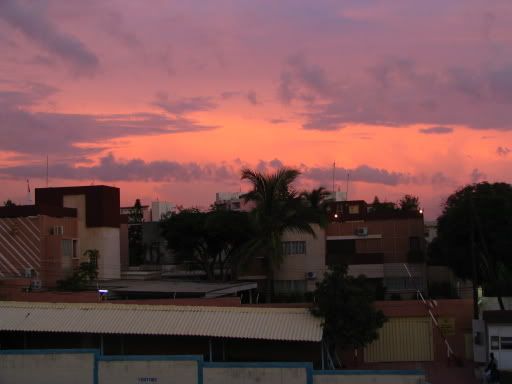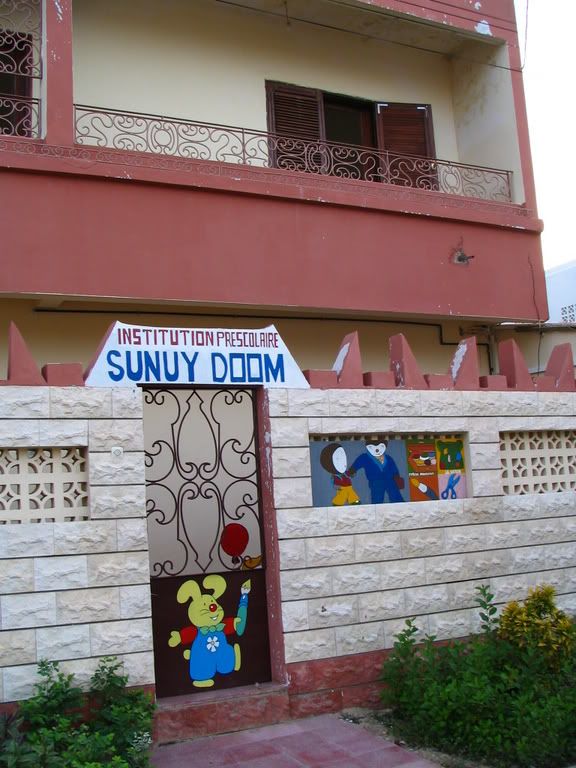Korite yi neexoon nañu de - and that's plural!
Korite is old news here. It's been more than a week since the festival, which - to the great embarrassement of some Senegalese, the great joy of others - happened twice. (see my last entry for explanation) The boubous that were bought at outrageous expense have been put away for the next wedding or baptism. (The next big festival on the Islamic calendar, Tabaski, is not an acceptable occasion to re-wear Korite boubous. Even more extravagant garmants must be purchased. I cannot imagine how impoverished families survive this celebratory double whammy.) Nonetheless, I'm only just posting my version of events. Last week passed in a mad haze thanks to an Islam paper, a Gender presentation, and a French test, (which turned out to be only 'entre parentheses') all compounded by my overactive sense of procrastination. Next we took a quick holiday to the Sine-Saloum region and today, finally, I have a free hour to write a post.
(Brittany and I in the courtyard of her extended family's luxurious home)
 The morning of Korite, eager to don my first Senegalese garment, I awoke early and walked to the house of Jenise's family in Mermoz. I was hoping to make it in time to go to mosque with the men, and was expecting the whole house to be bustling with preparation. However, I arrived to find only Jenise's older brother Iddie in full outfit; the rest of the house was fast asleep. Despite the last night's promise, I was quickly informed that it would be too akward for me to come to the mosque. I've found this sort of apparently sudden change of heart pretty standard in Senegal, so I walked home relatively unphased. I watched the sandy square behind the mosque fill up with prayer mats, and men in their starched white sabadoors, and still made it home in time to eat a little breakfast.
The morning of Korite, eager to don my first Senegalese garment, I awoke early and walked to the house of Jenise's family in Mermoz. I was hoping to make it in time to go to mosque with the men, and was expecting the whole house to be bustling with preparation. However, I arrived to find only Jenise's older brother Iddie in full outfit; the rest of the house was fast asleep. Despite the last night's promise, I was quickly informed that it would be too akward for me to come to the mosque. I've found this sort of apparently sudden change of heart pretty standard in Senegal, so I walked home relatively unphased. I watched the sandy square behind the mosque fill up with prayer mats, and men in their starched white sabadoors, and still made it home in time to eat a little breakfast. I was planning to spend the first part of day with Brittany, another friend's, extended family in Jebel, so I arrived at her door at the stroke of ten, decked out in sabadoor, hat, and baboushes (Moroccan slippers). I thought I struck quite a figure, but Brittany quickly cut me down to size. She was under strict instructions from her family not to arrive in bouboued splendor. Instead, we were to bring our finest garments in a plastic sack. Though it bamboozled me, in Senegal it seems to make obvious sense: the clothes that cost most families several arms and legs are of course not worn proudly all day long. Instead, you sit around all day until 6:30, the last half hour of sunlight. Then you don your finery and parade around for a brief few hours, before abandoning the boubou to the next minor celebration. (it's incomplete, but see my flickr photos)
I was planning to spend the first part of day with Brittany, another friend's, extended family in Jebel, so I arrived at her door at the stroke of ten, decked out in sabadoor, hat, and baboushes (Moroccan slippers). I thought I struck quite a figure, but Brittany quickly cut me down to size. She was under strict instructions from her family not to arrive in bouboued splendor. Instead, we were to bring our finest garments in a plastic sack. Though it bamboozled me, in Senegal it seems to make obvious sense: the clothes that cost most families several arms and legs are of course not worn proudly all day long. Instead, you sit around all day until 6:30, the last half hour of sunlight. Then you don your finery and parade around for a brief few hours, before abandoning the boubou to the next minor celebration. (it's incomplete, but see my flickr photos) (Me and the nearly suicidally over-active children of my Mouride neighbors during Korite #2)
(Me and the nearly suicidally over-active children of my Mouride neighbors during Korite #2)



